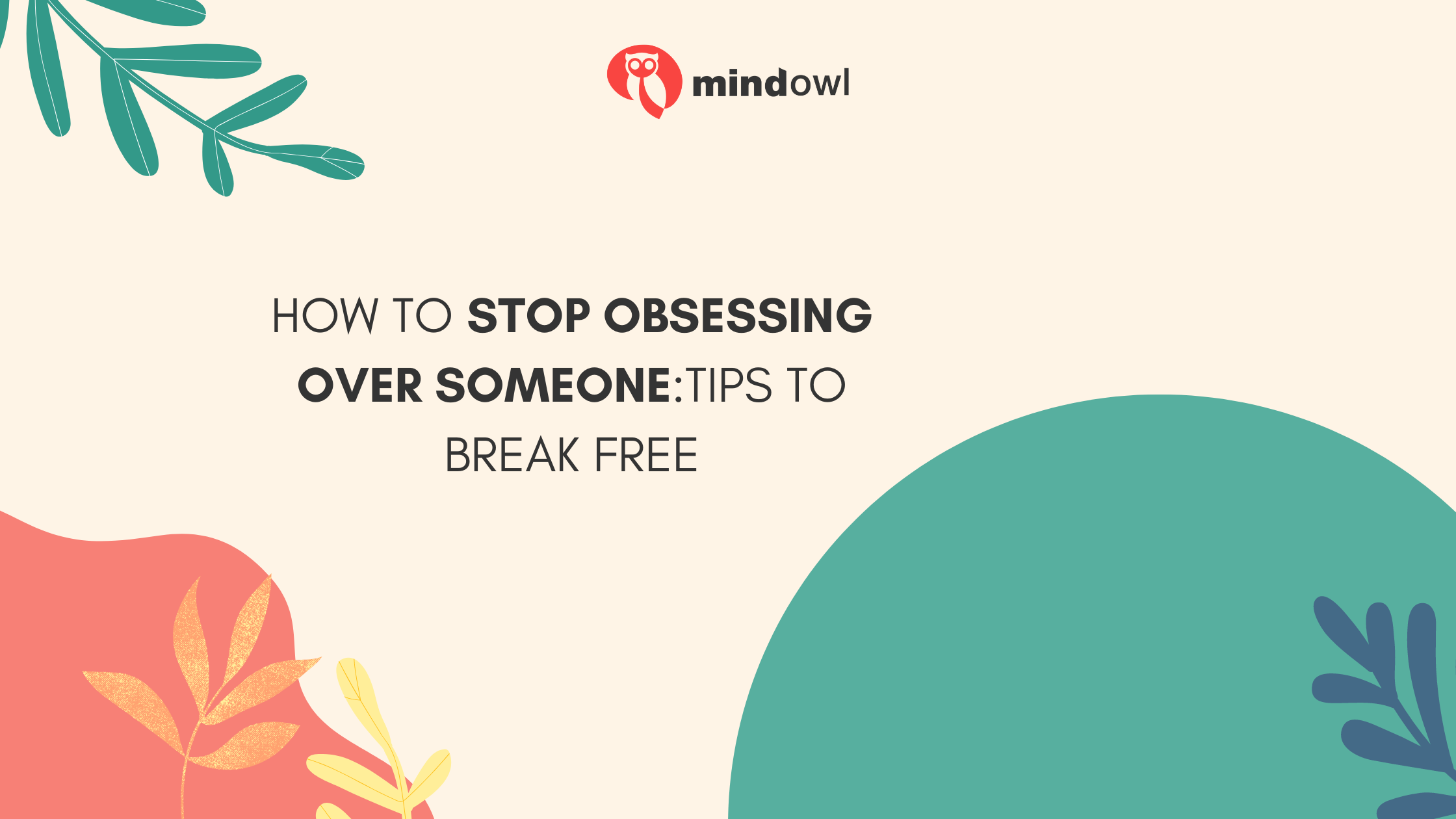We’ve all been there – obsessing over someone to an unhealthy degree. You can’t stop replaying interactions, checking their social media, and allowing that person to dominate your thoughts. It’s exhausting and prevents you from being present in your own life.
Obsessing, whether over an ex, crush, or friend, can take a serious toll on your mental health. The constant fixation leads to anxiety, distraction, and an inability to focus on anything else. But there are ways to break free from this obsessive thinking cycle.
With the right mindset shifts and coping strategies, you can regain control over intrusive thoughts about that person. This guide will explore techniques for letting go, refocusing your energy, and moving forward. Because at the end of the day, the person you should be obsessing over is yourself. It’s time to get your mind off them and reclaim your power.
Understanding Obsession: What Does it Mean?
Obsessing over someone means your mind is constantly filled with thoughts about them. You might find yourself thinking about what they’re doing, imagining spending time together, or worrying about their opinion of you.
This relentless focus can come from feeling unloved or believing you’re not good enough for them. Some people even feel an “attraction of deprivation,” where they are drawn to those who don’t treat them well because it feels familiar or confirms negative beliefs about themselves.
This struggle isn’t just emotional; it has deep psychological roots and hidden perks that keep us hooked. For instance, obsessing can make us feel connected to the person we admire, even if there’s no real relationship.
It’s a tricky cycle to break free from because these obsessive thoughts often bring temporary comfort or excitement despite their long-term distress. Moving on requires understanding not only why we obsess but also how it impacts our lives and relationships.

The Impact of Obsession on Mental Health
Inducing Anxiety and Stress
Obsessing over someone triggers stress and anxiety. Your mind gets stuck in a loop, thinking about the person you can’t have. This constant worry makes your heart race and disturbs your peace.
You feel tense all the time, unable to relax or enjoy moments. The fear of not being loved back haunts you day and night.
This state often mirrors symptoms of OCD—repetitive, intrusive thoughts that cause distress. Trying to control these thoughts only adds more pressure, making it hard to focus on work or hobbies.
Stress builds up when you put all your energy into obsessing rather than living your life or spending time with friends and family. It becomes a vicious cycle: the more you try to fight these feelings, the stronger they get.
Impact on Self-Esteem
Feeling inadequate often follows when you find yourself obsessing over someone. This sense of not being good enough can hit your self-esteem hard. You might compare yourself to the person you’re obsessing over or feel like you don’t measure up in some way.
These negative thoughts about your worth can take a toll, making it tough to believe in your own value.
Prioritising self-care is key to rebuilding that shattered self-esteem. Activities like taking up a new hobby, spending time with friends who love and appreciate you, or simply focusing on things that make you happy can help.
They remind you of your strengths and qualities, slowly patching up the cracks in how you see yourself. Engaging in positive relationships and hobbies helps fill the void left by obsession, guiding your mind towards healthier patterns of thought.
Disruption of Daily Life
Obsessing over someone can significantly disrupt daily life and normal functioning. The constant preoccupation with thoughts about the person can make it difficult to concentrate on work, studies, or other responsibilities.
Everyday tasks and routines may be neglected as the obsession consumes mental energy.
Social relationships and hobbies tend to suffer as the obsession becomes all-consuming. Productivity and performance at work or school can decline. In severe cases, the obsession may lead to stalking behaviours that could have legal consequences, further disrupting the person’s life
Effect on Existing Relationships
Friends and family might feel pushed aside as the person you’re obsessing over takes centre stage in your thoughts and actions.
This shift in focus can lead to feelings of neglect among those who care about you.
Obsessive love or ROCD strains relationships further, leading to decreased satisfaction both relationally and sexually with a partner. It doesn’t stop there—work relationships suffer too.
Colleagues may sense a change, feeling resentment due to perceived discrimination or lack of attention.
Signs of Obsession Over Someone
Identifying if you’re obsessing over someone can be tricky. It often sneaks up, becoming all-consuming before you realise it’s happening. Here are clear signs to watch out for:
- Constantly thinking about the person: You find your mind drifting to them at all hours, interrupting daily tasks and even sleep. Every little thing reminds you of them, turning ordinary moments into reminders of your obsession.
- Stalking their social media: Checking their profiles becomes part of your routine. You might scroll through their posts for hours, analyse their interactions with others, or wait eagerly for their next update. It’s a digital form of keeping them close, even if there’s no real interaction.
- Feeling extreme jealousy: When you see them talking to someone else or hear about their adventures without you, jealousy flares up strong and hard. This isn’t just about wanting what someone else has; it’s an intense fear of losing the connection you feel or think you have with them.
- Ignoring personal boundaries: You may overstep in ways that aren’t typical for you—constantly reaching out, asking overly personal questions, or wanting to know every detail of their day. Respecting boundaries doesn’t seem as important as getting closer to them.
- Seeking constant validation: You look for any sign that they reciprocate your feelings or thoughts about them. Every word or gesture is over-analysed for hidden meanings, hoping to find proof that your obsession is warranted and that they might feel the same way about you.
These signs indicate a fixation far beyond a healthy interest in another person’s life and well-being.
Practical Techniques to Manage Obsessive Thoughts
Acknowledging the Thoughts
Realising you’re obsessing over someone starts with admitting to yourself the thoughts are there. This step is vital because it’s the gateway to gaining control over those thoughts, just as acknowledging triggers is crucial for managing symptoms of OCD.
It doesn’t mean you’ve failed or lost control; rather, it’s an important first move towards changing your thought patterns.
To handle these obsessive thoughts effectively, identify them without judgement. You might think about someone constantly or imagine scenarios that have never happened—and that’s okay.
Recognise these moments and gently remind yourself that they don’t define your worth or futures. Acknowledging them can actually lessen their grip on your daily life, clearing a path toward healing and growth.
Distract and Refocus
After acknowledging obsessive thoughts, practice distraction and refocusing techniques to keep your mind occupied. Engage in physical activities like walking or swimming, redirecting focus away from distressing thoughts.
Purposeful daily activities can help prevent obsessive thinking about a specific idea – finding solace in productive tasks is crucial for managing obsessions. Remember that keeping the mind busy with intentional actions can be effective in breaking the cycle of obsession.
You’re not alone if you find it difficult to stop obsessing over someone – purposeful daily activities and engaging in physical exercises offer effective strategies to distract and refocus your mind from painful feelings.
Setting Boundaries
Setting boundaries is crucial in managing obsessive thoughts and breaking free from them. Loose boundaries can lead to overinvolvement in others’ lives, people-pleasing, and trying to control others.
Establishing boundaries is key for conquering obsessive thoughts and can be practiced with a few simple steps.
Examples, tips, and worksheets are available to help individuals set boundaries and practice good self-care. Signs of loose boundaries include overinvolvement in others’ lives, perfectionism, people-pleasing, and trying to fix and control others with judgments.
The Role of Journaling
Journaling can aid in processing emotions and coping with mental health symptoms. It’s a beneficial tool for personal growth, allowing individuals to delve deeper into their thoughts and aspirations.
Additionally, taking breaks from journaling may help reduce unhelpful chatter in the mind.

Seeking Professional Help and Support
Seek professional help for practical techniques to manage obsessive thoughts. It can offer guidance on overcoming the obsession with helping others by turning inward and examining your own mind, providing crucial support in breaking free from obsessive thoughts and behaviours.
A licensed therapist can provide actionable steps or tips for you to implement.
Conclusion
In conclusion, breaking free from obsession over someone is possible. Using practical techniques like acknowledging thoughts, setting boundaries, and seeking professional help can make a difference.
Spending time with friends and finding healthy coping mechanisms are steps towards overcoming obsession. Limiting triggers such as social media use can also aid in the process of letting go of obsessive thoughts and feelings.
FAQs
1. Why do I start obsessing over someone, and is it normal?
It’s totally normal to find yourself obsessed with someone, whether it’s a new crush or an ex. Our brains can get hooked on all the good feelings that come from thinking about them. But remember, just because you’re obsessing doesn’t mean you need to keep feeding those thoughts.
2. What should I do if I can’t stop thinking about someone?
First off, don’t beat yourself up—it happens! Try redirecting your energy into something positive like a hobby or exercise. Spend time with friends and family; their company can help take your mind off things. And yes, deleting their number or unfollowing them on social media might give you the space you need.
3. Can focusing too much on one person affect my mental health?
Yes, putting all our energy into another person we tend to lose sight of ourselves which can lead to anxiety and affect our sense of self-worth. It’s important to maintain a balance between relationships and personal well-being.
4. How can I break free from obsessing over someone who doesn’t reciprocate my feelings?
Realise that not everyone will feel the same way about us—and that’s okay! You deserve someone who loves you back in equal measure. Remind yourself of your worth outside this obsession; maybe pick up a side hustle or go running—activities that boost your mood and self-esteem.
5. Is talking to a professional an option for dealing with obsessive thoughts?
Absolutely! If you’re having trouble moving past these thoughts on your own, chatting with a mental health professional like an LMFT (Licensed Marriage and Family Therapist) could be super helpful. They offer advice tailored specifically for you.
6. What are some practical steps to stop obsessing over someone?
Firstly, acknowledge how you feel but don’t let those emotions control everything you do. Next, take note of when these obsessions pop up, and try telling yourself not to ruminate over them. Get enough sleep, hang out more with friends, and maybe even unfollow the person online. Every little step helps in regaining control.
MindOwl Founder – My own struggles in life have led me to this path of understanding the human condition. I graduated with a bachelor’s degree in philosophy before completing a master’s degree in psychology at Regent’s University London. I then completed a postgraduate diploma in philosophical counselling before being trained in ACT (Acceptance and commitment therapy).
I’ve spent the last eight years studying the encounter of meditative practices with modern psychology.

